HeroMode started as a nebulous idea that kept growing over the years. This idea was shaped by several books on the topics of behavioral science, motivation, and habits. These insightful works make the science on human behavior accessible to everyone, and give us the tools to design our own behaviors and drive success. In this season of gratitude, we want to share with you the books that form the philosophical backbone of HeroMode!
Image Credit: djvstock
Thinking, Fast and Slow (2011)
No book list on behavioral science can go without the foundational book by Nobel Prize winner Daniel Kahneman. This groundbreaking work is an essential read for anyone interested in understanding the relationship between how we think versus what we do, and is an excellent overview of the field of behavioral economics, a field that Professor Kahneman helped to found.
In this book, Kahneman introduces the concept of System 1 and System 2 thinking. System 1 is fast, intuitive, and emotional, while System 2 is slow, logical, and effortful. The interplay between these two systems give rise to the many biases and heuristics that can lead us astray. Understanding the role of these two modes of thinking is key to optimizing our decision-making and behavior.
Predictably Irrational (2008)
Professor Dan Ariely is another giant in the field of behavioral economics. In "Predictably Irrational: The Hidden Forces That Shape Our Decisions", Ariely challenges the classic economic assumption that people are rational actors, and instead shows that human decision-making processes are influenced by emotions, social norms, and cognitive biases.
If you'd like a quick glimpse into this book, Professor Ariely has also given an excellent TED talk on this topic.
The Undoing Project (2016)
If you have enjoyed movies like "Moneyball", "The Big Short", and "The Blind Side", then you are already familiar with the works of the master story teller Michael Lewis. In "The Undoing Project: A Friendship That Changed Our Minds ", Lewis gives the field of behavioral economics an all-star treatment, telling us a very human tale behind the rise of the field.
Nudge (2008)
If books like "Thinking, Fast and Slow" and "Predictably Irrational" tell us why we behave the way we do, then "Nudge" gives us the recipe to design our behaviors. Written by Nobel Prize winner Richard Thaler, and Professor Cass Sunstein, "Nudge" makes us feel optimistic about our ability to drive our own behaviors and achieve success.
"Nudge" provides many real-life examples of guiding human behaviors through simple design choices. The power of these "nudges" cannot be understated. This means that we can shape our environment to make it easier for us to do the right thing. This learning is core to HeroMode: make it more fun to get stuff done, so that we are more motivated to do them!
Misbehaving (2015)
Also by Professor Thaler, "Misbehaving: The Making of Behavioral Economics" is a more personal account of the rise of behavioral economics. While we now take for granted that humans are constantly battling against our own biases, for decades, the field of economics has been built on the framework that humans are perfectly rational actors. For a long time, challenges against this framework were dismissed or even ridiculed. This book tells the intellectual journey of Professor Thaler and his colleagues as they fought to bring "human" into "human actors".
The Righteous Mind (2012)
What does a book on moral psychology have to do with behavioral science and HeroMode? Consider this quote from Professor Haidt in "The Righteous Mind":
“The mind is divided, like a rider on an elephant, and the rider's job is to serve the elephant.”
Doesn't this analogy sound very much like System 1 and System 2 thinking?
Understanding the role of emotions in our decision-making is key to designing our behaviors, both on the individual level and on the societal level. Make the elephant happy, then it'll take us, the rider, to where we want to go. Ignore the elephant, and we'll be stuck in the mud and forever puzzled why we can't make progress.
Drive (2009)
In "Drive: The Surprising Truth About What Motivates Us", Daniel Pink highlights the importance of intrinsic motivation. This is opposed to the more commonly used extrinsic motivation, such as monetary rewards or even punishments. Pink argues that extrinsic motivation can be effective for simple, mechanical tasks, but for tasks that require creativity and problem-solving, extrinsic motivation will actually hinder performance in the long run. Instead, intrinsic motivation, such as autonomy and a sense of purpose, is required for sustained performance.
This is a very important insight for HeroMode. You choose your own adventures and quests, you assign how many points each quest is worth, and you design the rewards that you can redeem. Being in control of your own journey is a key part of the HeroMode experience.
Mindset (2006)
Speaking of "motivation comes from within", Professor Carol Dweck's "Mindset: The New Psychology of Success" is another excellent book on paving the way to success by having the right internal mindset. By embracing a growth mindset, and be open to learning and improving, we put ourselves in a much better position to endure challenges and achieve success.
Peak (2016)
If you've heard of the 10,000 hours rule, or the term "deliberate practice", then you have Professor Anders Ericsson to thank. In "Peak: Secrets from the New Science of Expertise", Professor Ericsson and Robert Pool delve into the science behind achieving mastery and expertise. Central to this is the concept of deliberate practice: beyond simple repetition, deliberate practice is highly structured, and has a specific goal of improving performance. Simply put, practice with your System 2, and don't let your System 1 take over on autopilot.
Outliers (2008)
The 10,000 hours rule was popularized by Malcolm Gladwell in "Outliers: The Story of Success". It takes time to get really, really good at something. An extremely readable book, "Outliers" is a collection of stories of people who have achieved extraordinary outcomes.

The Power of Habit (2012)
The cover of "The Power of Habit: Why We Do What We Do in Life and Business" portrays flywheels. This is a very apt callout to the central theme of the book: the habit loop. The habit loop consists of three parts: the cue, the routine, and the reward. Done right, then we can kick start a virtuous cycle of good habits. Done wrong, then we suffer from the addictive pull of bad habits.
The concept of "habit loop" is central to HeroMode. Features like Repeat Quest, Activity Calendars, and Points & Rewards are all designed to help you build good habits and kick bad ones.
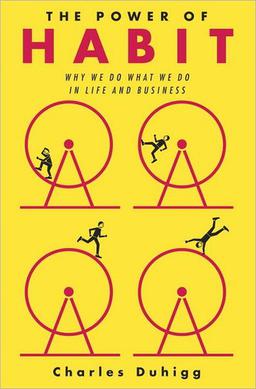
Atomic Habits (2018)
Forming a habit can be such a daunting task. In "Atomic Habits", James Clear advocates an approach to habit formation that focuses on small, incremental changes. Like the wise words of Dory, "just keep swimming", Clear suggests that we can bring about remarkable long-term impact by continuously making small wins.

That's it for our list of books that shaped HeroMode! Did we miss any of your favourites? Let us know!